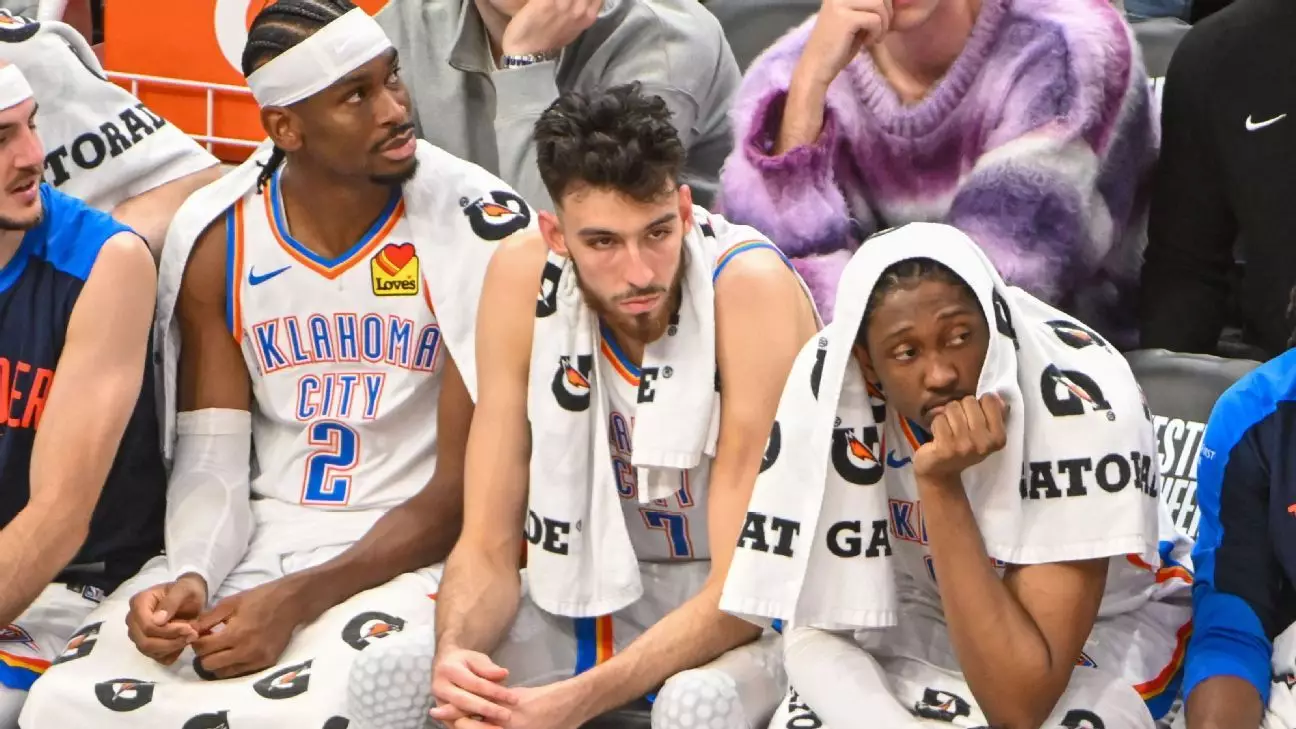The Oklahoma City Thunder faced a staggering defeat in Game 3 of the Western Conference finals, suffering a humiliating 143-101 loss to the Minnesota Timberwolves—the most lopsided playoff defeat in the franchise’s history. The palpable frustration and disbelief among players and fans alike were evident as they witnessed the team crumble under pressure. The game highlighted the stark reality of playoff basketball: success can evaporate as swiftly as it is achieved. After dominating the first two games of the series, the Thunder entered this pivotal match with a false sense of security, only to be blindsided by a Timberwolves team that came out swinging.
A Lesson in Physicality
The disparity in physicality and intensity between the two teams was undeniable. Chet Holmgren, the Thunder’s versatile power forward/center, succinctly summarized the debacle, noting, “Wherever they wanted to go, they got there.” The Timberwolves employed a high-pressure defense that left the Thunder gasping for air, exemplifying a fundamental truth in sports: it’s not enough to have talent; one must also bring tenacity and resolve to the court. Oklahoma City’s starters seemed sluggish, unable to adjust to Minnesota’s relentless onslaught. It seemed as if the Thunder’s resilience was unraveling before their eyes, raising questions about their mental fortitude.
When Stars Dim
Shai Gilgeous-Alexander, the newly crowned MVP and a scoring titan, had a woeful night, finishing with a mere 14 points—a disheartening outcome for a player who had averaged 34.5 points in the first two games of the series. This drastic downturn not only reflects the Timberwolves’ formidable defense but also points to the mental strain often experienced in high-stakes scenarios. With poor shooting stats—4-of-13 from the field—and an unusual lack of free-throw attempts, Gilgeous-Alexander’s performance felt like a cruel twist of fate. The focus on him intensified, marking a significant shift in the game’s dynamics, as he was unable to take over, which would normally be expected of an MVP-caliber player.
The Numbers Don’t Lie
The statistical figures from the game paint a sobering picture. Oklahoma City’s starters managed to compile a mere 49 points on 15-of-39 shooting, horrendously outperformed by Timberwolves duo Anthony Edwards and Julius Randle, who combined for 54 points on a staggering 21-of-32 shooting. The Thunder were unable to match that level of efficiency, and as Gilgeous-Alexander pointed out, continually taking the ball out of the net inhibited their ability to find rhythm. This reality underscores the vital nature of defense in basketball: when opposing teams are allowed to set their defensive strategies, scoring becomes significantly more challenging.
Defensive Collapse
Perhaps the most alarming aspect of the defeat was the Thunder’s performance on the defensive end. Once heralded for their defensive prowess, they allowed the Timberwolves to shoot 57.3 percent from the field and 50 percent from beyond the arc. The team struggled to create turnovers, racking up only ten— an astonishing low for a squad that thrives on defensive pressure. The lack of urgency on defense raised eyebrows and prompted concerns about whether the Thunder could rebound from such a glaring breakdown.
The Path Forward
In the wake of this catastrophic defeat, all eyes will be on Oklahoma City as they prepare for the next game. Chet Holmgren’s sentiments reflect a lingering question: “Are we going to get back up or not?” This pivotal moment offers a chance not just for redemption but for introspection. The ability to rebound from defeat sets champions apart from mere participants. Gilgeous-Alexander expressed the importance of response, acknowledging that in the world of competitive sports, resilience is paramount.
The Thunder now stand at a crossroads. Will they harness the sting of this loss to fuel their comeback? Or will they allow defeat to define them? The answer will unfold as the playoffs progress and their true character is tested. The stakes are high, and the upcoming games offer not only an opportunity for victory but for the Thunder to reclaim their identity as a dominant force in the league.


Leave a Reply